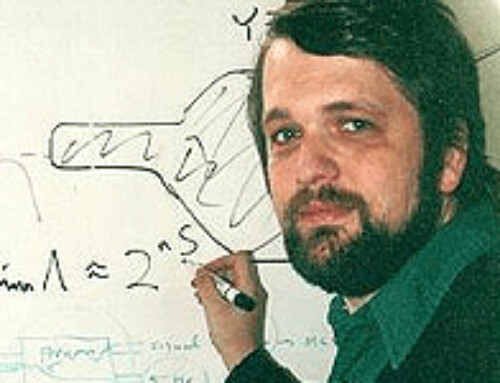Since I met Sean Carroll about a year ago, my life has changed for the better. In particular, I started following his wife @JenLucPiquant on Twitter and began reading her Scientific American blog, Cocktail Party Physics, a great place to get the latest news on physics – with a twist. Today, through one of Mrs. Ouellette’s RTs (re-tweets), I came across a fascinating article on Feynman, titled `Richard Feynman: Life, the universe and everything.‘
The article goes into some detail about the unusual life Feynman led, describing some of its high points without shying away from the idiosyncratic aspects of the master physicist’s life. Described in the article is this colorful animation that a graphic designer made of a brief excerpt from the now famous BBC interview of Feynman (The pleasure of finding things out):
As the Telegraph article describes, the little animation has gone viral, spreading the message that science actually adds to our ability to appreciate beauty in the world: Unlike popular belief would have us think, science is not dry, it is not cold, not clinical, or simply analytical, devoid of emotional impact on the ones that have devoted their lives to pursue it. Science is the one honest, brave (and obviously awesome) answer humanity has come up with to the burning question:
What just happened here?
The truth is that science always begins with the following answer: I don’t know. That is the honest part. Then comes the desire to know, otherwise known as curiosity. Whereas many of us will say of certain things: We can’t possibly know this, the scientist will say: I will try anyways. That is the brave part. Because some questions lead to answers that we don’t really want to accept – we are afraid that the answer may break something inside of us, something we invested time to construct, something we cherish, something important like the feeling of accomplishment for effortlessly appreciating the sublime beauty of a flower.
And then, of course, there is that thing about science being hard to do. It is. You can try to bs your way through science, and some do try, but then you might as well be a car salesman and make some good money in the process (actually, I met an honest car salesman just three weeks ago and I am still not sure what to make of it – he works for a Mini Cooper dealership in L.A. and that is all I am allowed to say in order to protect him and his family.)
But this is only half of the story…
The question that (too many) scientists are afraid to ask themselves is the following: What if my science doesn’t speak for itself? What if my science seems super-boring to others, or simply pointless (like studying fruit flies)? What if I actually need to go out into the unknown (the world that lies outside the Ivy Tower) in order to engage the public, to get the world excited about my discoveries?
Aristotle, the grandaddy of analytical thinking, wrote the most influential treatise on Rhetoric (the art of persuasion) for good reason. So here is my thesis: Every other Sunday morning, every church hosts a scientist to give a public lecture (no boring, arcane jargon allowed) on subjects ranging from the Big Bang Theory to the Theory of Evolution and Stem Cell research. No need to try to reconcile science with religion during the lecture, or be combative – just a good story based on scientific findings – let the audience decide if they want more. All I am saying is: Give it a try. Like pastors, there are scientists out there who love to tell a good story and provide some food for thought (and maybe raise some money from the parish for their good work). We can even use animations like the one above, or this one from PhD Comics.
What do you think?


